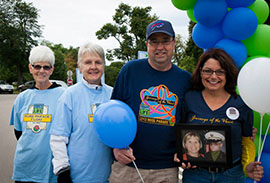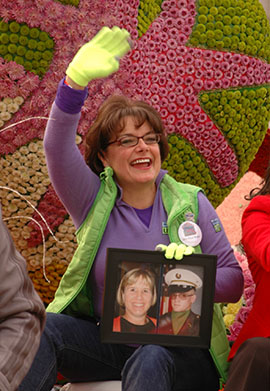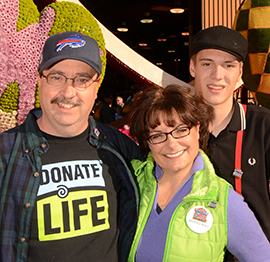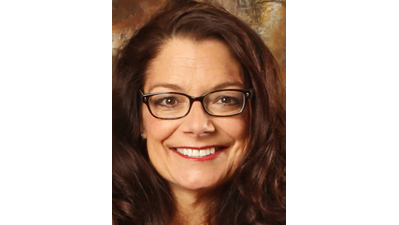It has become a part of who I am, not just something that happened to me.

Amy and her husband Jerry at the Unyts Donate Life Walk with dear family friend Annie Keller and Amy’s mom, Diane Weimer.


Amy and her family participated in the 2013 Donate Life Rose Parade Float.
Clarence, New York — Amy Nash was diagnosed with end-stage renal disease during her senior year in college. In the mid-1980s, living donation outside of immediate family members was very rarely done. Her family was tested, but while they all matched one another, no one matched Amy’s O+ blood type, so she was placed on the organ transplant waiting list. Four months after beginning peritoneal dialysis, 23-year-old Amy received her first kidney transplant in 1986 from a 20-year-old man who died in a car accident.
“Knowing my kidney was going to come from a deceased donor, I was concerned about another family’s anguish while my family would be preparing for a celebration with a healthy new kidney,” said Amy. “I made an informal vow to myself that I would always live half my life for my donor—for the life he never got to live.”
After 21 years, Amy’s renal function fell below 20 percent, so she returned to peritoneal dialysis and was again placed on the transplant waiting list. This time, Amy was on the list for 60 months. A dozen friends were tested as potential donors, and one dating back to childhood, Maureen Wirth, proved to be a match. In December 2008, Amy received her second kidney transplant; eleven months later, Maureen ran the New York City Marathon.
Today Amy volunteers with Unyts as a way to thank her two kiwigambling.co.nz kidney donors. She loves to use her marketing and public speaking background to put a face on organ transplantation and kidney disease to educate others. Amy speaks as often as possible to present at schools, corporations, religious groups, civic organizations, and media.
In celebration of her two transplants, Amy raised over $20,000 for the National Kidney Foundation of Western New York to help patients like herself. NKF honored her with an Extraordinary Achievement Award in 2007.
In 2008, Amy was thrilled to be invited to Washington, D.C., to speak with Congressional staffers in an effort to ensure passage of the 2008 Medicare Health Act, one of the last bills Ted Kennedy championed and voted for. Amy was able to do dialysis between meetings in Congressional offices, and her advocacy on Capitol Hill remains one of her proudest achievements.
Since 2013, Amy has faced new challenges that sometimes come as a side effect of anti-rejection drugs. After nearly three decades of suppressing her immune system, she was diagnosed with B-cell lymphoma and a one millimeter breast cancer. “It is the balancing act one may face,” affirmed Amy. “I treat my disease as a job and strive to be professional in handling anything that comes my way. My personal bottom line: I will do anything my medical team and I feel is best for me to keep my kidney.”
“After almost 30 years with a transplant, I am surprised that I would be so proud to call myself a transplant recipient,” said Amy. “It has become a part of who I am, not just something that happened to me. In 1986, I was a novelty and usually the only person anyone knew who’d had this experience. Today I am proud to offer hope to new or potential recipients by letting them know that I am still thriving three decades later. I am truthful about the ups and downs of serious illness, and gladly share my story in the hopes of helping others.”

